The 2021 Minnesota Legislative Year in Review
This annual report provides a summary of the legislative session in Minnesota—the heart of Medical Alley.
Introduction
The 2021 legislative session began in a tumultuous year with the COVID-19 pandemic continuing to permeate every aspect of life. Adjustments were made – with remote voting, hearings, and meetings – but this new mode of operation brought fresh challenges that took a bit longer to overcome, as evidenced by the special session in June. Not to mention the fact that Minnesota was yet again the only state in the nation with a divided legislature.
Despite the challenges of remote advocacy and an unusually opaque omnibus process, the 2021 Minnesota state legislative session was one of the most productive sessions ever for the Medical Alley Association. The Angel Tax Credit and LaunchMN were funded for another year, Medicaid postpartum coverage was extended to 12 months after birth, and Minnesota’s telehealth statutes received a timely refresh, to name a few of the many wins seen in just six short months.
The 2021 Minnesota state legislative session was one of the most productive sessions ever for the Medical Alley Association.
Without a doubt, our members played a critical role in achieving this banner year. Policy can develop and move quickly, and we are grateful our members were open to meeting the challenge. They testified in committee, helped our team craft letters, and even wrote their own to push critical legislation across the finish line.
As committee work began in earnest around late January, the remote model started complicating things. Sure, the occasional connectivity or audio gaff made watching remotely a bit more entertaining, but due to the few channels available for broadcasting, committees were only allowed to meet for three hours at a time. As markups began, time constraints stifled public engagement, leaving little time for anything other than bill walkthroughs and debate.
Bipartisanship became harder to find as Senate and House minorities were shut out of the process. Rifts grew and ultimately, none of the conference committee reports (i.e. the budget agreements) were able to pass before regular session concluded. After seven special sessions last year, the singular one in June seemed more like a brief extension of regular session than anything else. Through it all – and mainly behind closed doors – budget targets were agreed to, compromises were met, omnibus bills were finalized, and a government shutdown was avoided.
Our policy and advocacy team has compiled this detailed recap of the 2021 Minnesota State legislative session in the hopes that you – our members – will gain insights into the work we do to foster innovation, improve the startup ecosystem, and increase access to care here in Minnesota's Medical Alley.
Session recap
Like the previous year, the 2021 legislative session began remotely, which required significant flexibility for all involved. The public was not allowed to enter the Capitol or legislative office buildings to attend hearings or testify. Committee hearings and floor sessions were fully virtual and the public had the opportunity to weigh in only via Zoom.
As COVID-19 vaccines rolled out and became more accessible, operations at the Capitol returned to in-person through a hybrid model. Slowly at first, but gradually more once mask mandates were lifted, legislators and staff members began trickling back into the buildings to work in person.
Because of the virtual nature of session, leadership in both the House and Senate encouraged members to focus on issues that could be tackled this year. This constraint limited what priorities would be addressed and who would participate in the discussions. Committees were limited to 90-minute meetings and often testimony and engagement from legislators was minimal due to no one being in the same room. Testimony from the public was often limited and, in the case of some House hearings, testimony and debate was even more abbreviated to only a few minutes. Ultimately, transparency suffered during the 2021 regular session.
Although transparency suffered in the 2021 session, its virtual nature allowed more Medical Alley members to have a seat at the table and gain greater engagement with lawmakers.
Balancing the budget
The most front and center issue in this year’s session was the state budget. The legislature’s main task was to pass a balanced, two-year state budget that funds the government, and much of the discussion focused on whether the state had a surplus or was instead facing a deficit. In a surprising turnaround, the state budget projected a $1.6 billion surplus near the beginning of session in February of 2021. This was great news for legislators who had previously been seeing significant economic downturn due to the pandemic.
Another major component that influenced budget discussions was the influx of $2.8 billion in federal aid to the state of Minnesota from the American Rescue Plan Act (ARPA). This money could be used to offset General Fund spending in some cases, so it became a significant and occasionally challenging part of budget negotiations for legislative leaders with competing priorities. A large portion of the federal aid flowed directly to local governments and targeted programs as well, bringing the total amount of aid from ARPA much higher than the original $2.8 billion state allocation.
Negotiating omnibus bills
As in previous sessions, legislative deadlines were set early (Mid-March – early April) in an attempt to reach agreement between the House, Senate, and Governor as soon as possible. However, Omnibus budget bills weren’t rolled out until after the Easter/Passover break, leaving stakeholders little time to read through the bills and prepare public testimony. Not only was this timeline a challenge for stakeholders, but also both minority caucuses that were deprived involvement in the negotiation of these massive budget bills.
After both bodies passed their first drafts of omnibus bills, conference committees met to walk through the bill language. These meetings varied in format based on the body, as the House and Senate had different policies around in-person hearings while the mask mandate was in place.
After these initial public conference committee meetings took place, closed door negotiations began between committee chairs and legislative leaders. These private meetings are where the most productive conversations happened and decisions on bills were actually made. Very few decisions were made in public, though it is important to note that some committees did make more of an effort to review language in pubic, like Health and Human Services, Agriculture, and a few others.
In the final hour of the 2021 session, Governor Walz, Speaker Hortman, and Leader Gazelka, emerged with a universal deal to wrap up negotiations and pass a state budget. The deal included a new set of deadlines for legislators, along with higher-level policy and budget agreements. If you have an interest in seeing what all was included in the agreement, click here.
In typical legislative fashion, none of these new deadlines were met and the legislature headed into a special session.
Special session began on June 14 with the renewal of Governor Walz’s emergency powers. More on the dynamics of this year’s first special session are below.
Medical Alley Association hearing
The Medical Alley Association had the opportunity to present during a State Senate committee hearing this session, highlighting the ways countless association members led the fight against COVID-19. This hearing was an excellent opportunity for legislators to better understand how the private sector came together and innovated to combat the COVID-19 virus. Zipnosis, Bio-Techne, Breathe99, and Vyriad all shared the story of their work across the nation, how they worked quickly to developed different technologies. From the development of an oral COVID-19 vaccine to creating a highly efficient mask, Medical Alley Association members made an undeniable impact here in Minnesota and around the world, and it was an honor to help shine a spotlight on their work.
We encourage you to watch a recording of the committee hearing, below.
Special session
Special sessions aren’t so special after all. As was true during the past few years, the legislature didn’t finish its business on time and went into extra innings. Legislative leaders struck a universal budget deal with a few days left in regular session, but committee chairs didn’t finish their work in time to adjourn on the last day of regular session. A special session was therefore guaranteed.
There were now two new deadlines for committee chairs to work toward. Budget agreements had to be finalized by May 28 and all outstanding policy issues had to be agreed upon by June 4. Committee chairs would negotiate budget and policy items in their issue area, and if they got to a standstill, leadership would step in and find a path for agreement. Most committees did not meet either of these new deadlines, so a lot was left to accomplish once special session officially began.
Special session begins
Special session gaveled in on June 14. The day was chosen because it was the day that Governor Walz needed to renew his executive powers and ultimately his powers were renewed for another 30 days. Legislative leaders explained that special session would last anywhere from seven to 10 days, with the ultimate deadline being June 30. If a budget was not passed and signed by the Governor by June 30, the government would shut down. It seemed no legislative leader thought a government shutdown was necessary nor that it would happen.
Special session began with very little official legislative activity. Working groups were supposed to meet to discuss omnibus bills, hear public testimony, and determine what policies and spending items would be in each bill. Instead, very few working groups met formally with an option for the public to watch. Negotiations, for the most part, took place behind closed doors between committee chairs and/or legislative leaders. The public did not have much opportunity to weigh in on omnibus bills and unfortunately, transparency continued to suffer.
Because of their commitment to avoiding a government shutdown, legislative leaders were able to compromise and come to a budget agreement with just hours remaining before the deadline.
As many suspected, special session ran right up to the June 30 deadline that would have triggered a government shutdown. Thankfully, legislators avoided this scenario and passed all budget bills, as well as the tax bill. After passage of the last few bills, the House adjourned special session sine die. The Senate, however, did not adjourn on June 30 and instead decided to stay in to ensure all necessary bills were signed, while also considering the confirmation of some of Governor Walz's cabinet members.
Confirmation of cabinet members
Six of Governor Walz’s appointees were considered by the Senate during the special session, which ended upon adjournment sine die on Wednesday, July 7.
The following appointees were confirmed by the Senate during the final days of special session: Mark Phillips (Commissioner, Iron Range Resources and Rehabilitation Board, IRRRB) and Aaron Vande Linde (Director, Minnesota Office of School Trust Lands).
Others who were not formally considered by the Senate and were not on the floor for an official vote were: Jennifer Ho (Commissioner, Housing Finance Agency), Sarah Strommen (Commissioner, Department of Natural Resources), and Dean Compart (Board of Animal Health). There was speculation that Laura Bishop, the acting Commissioner of the Pollution Control Agency, would not be confirmed by the Senate. Before she came up for a confirmation vote on the Senate floor, she submitted her letter of resignation to Governor Walz.
The Senate adjourns
On July 7, rather than prolong the special session to consider other appointees, the Senate Minority Leader moved to adjourn sine die. After significant floor debate, both caucuses voted in favor of adjournment.
The special session ended with some politics on the part of the Senate. Confirmations are a unique and important responsibility that the Minnesota Senate has; the majority caucus vetted current Walz cabinet members and decided to act on confirmations after the rest of the legislative business was taken care of.
It will be interesting to see how this decision plays out in dynamics between the Senate Republican majority and the Administration.
We fully anticipate the legislature to return in September for a special session to ratify frontline worker pay recommendations.
Virtual Medical Alley Day at the Capitol
Medical Alley Day at the Capitol is a signature annual event, bringing together legislators with health technology and care organizations that power Minnesota’s economy and make it The Global Epicenter of Health Innovation and Care®. Although it looked a little different this year, our virtual model made it easier to connect Medical Alley leaders with key legislators. In their meetings, our delegates discussed challenges facing their industries and ways businesses and policymakers can partner to drive strong economic growth for our state.
To kick off our event, Department of Administration Commissioner Alice Roberts-Davis and Department of Employment and Economic Development Commissioner Steve Grove addressed our members. Click below to view their remarks!
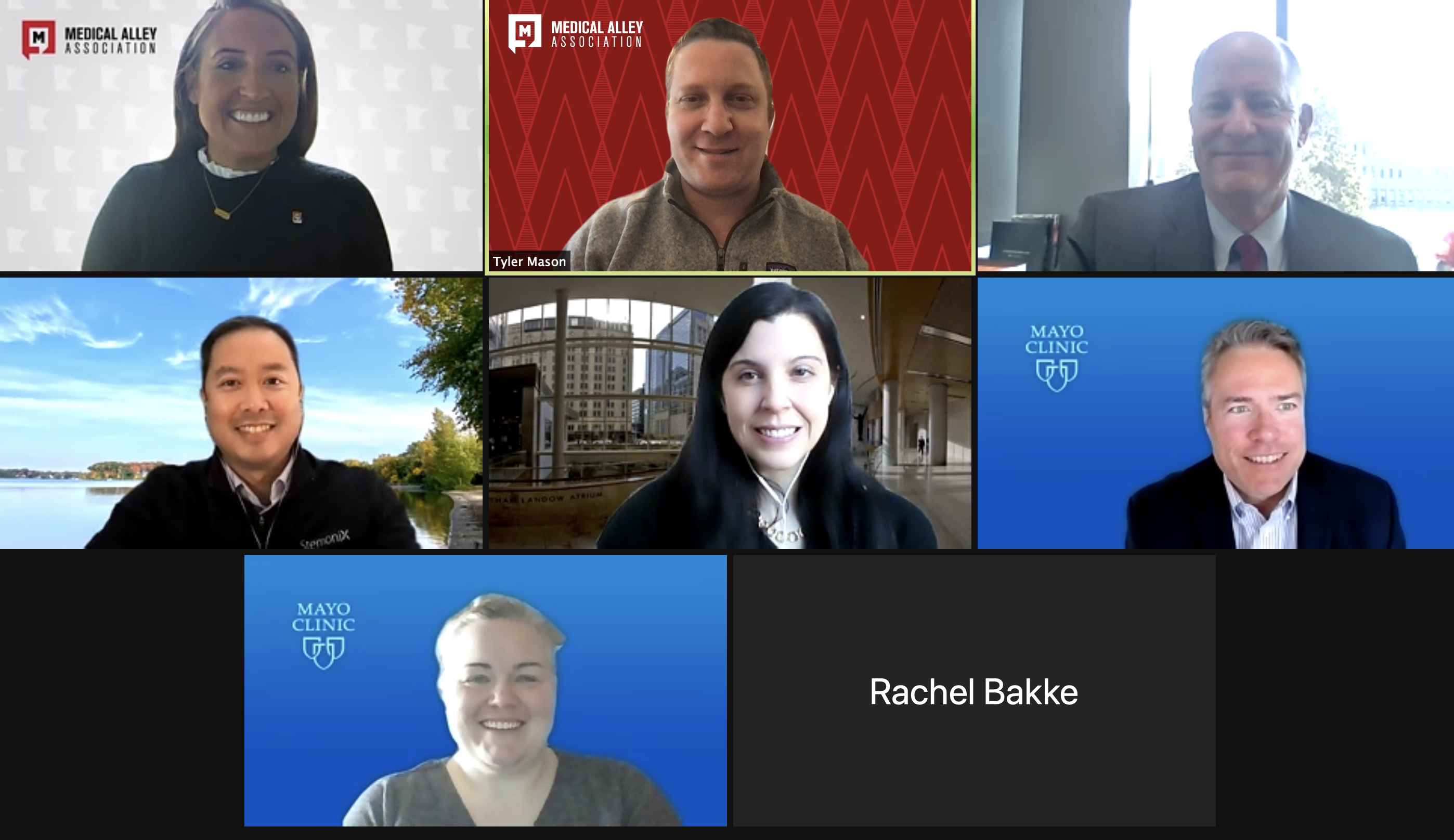
Senate Majority Leader Paul Gazelka speaks with leaders from Mayo Clinic and Vyant Bio.
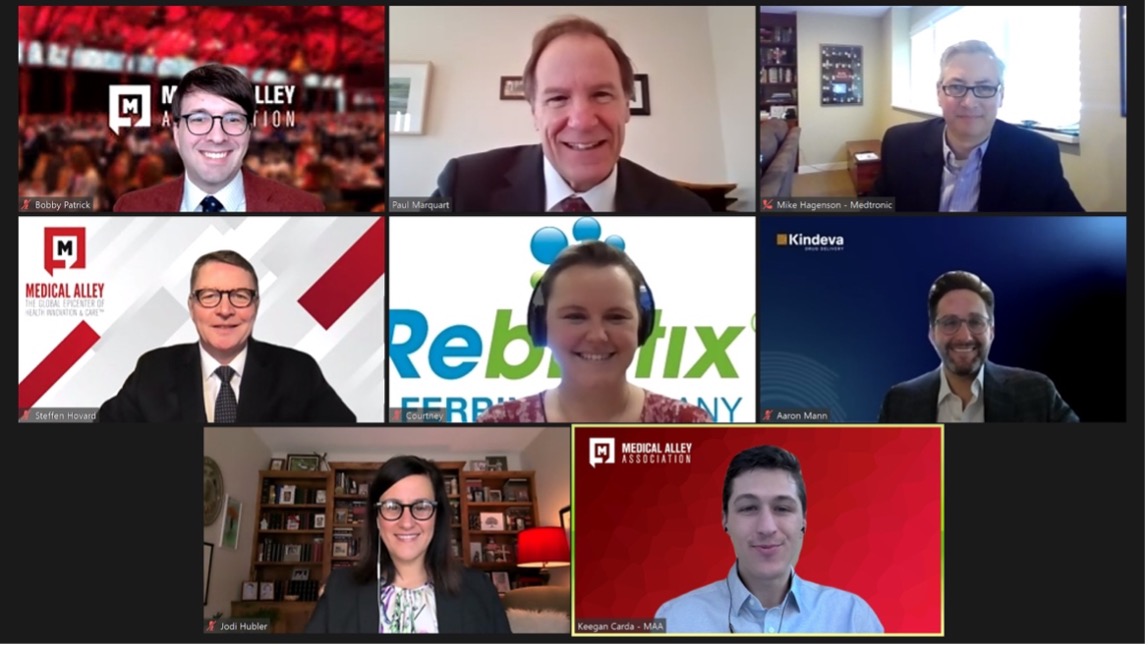
Representative Paul Marquart takes time to meet with Rebiotix, Medtronic, Lemhi Ventures, and Kindeva.
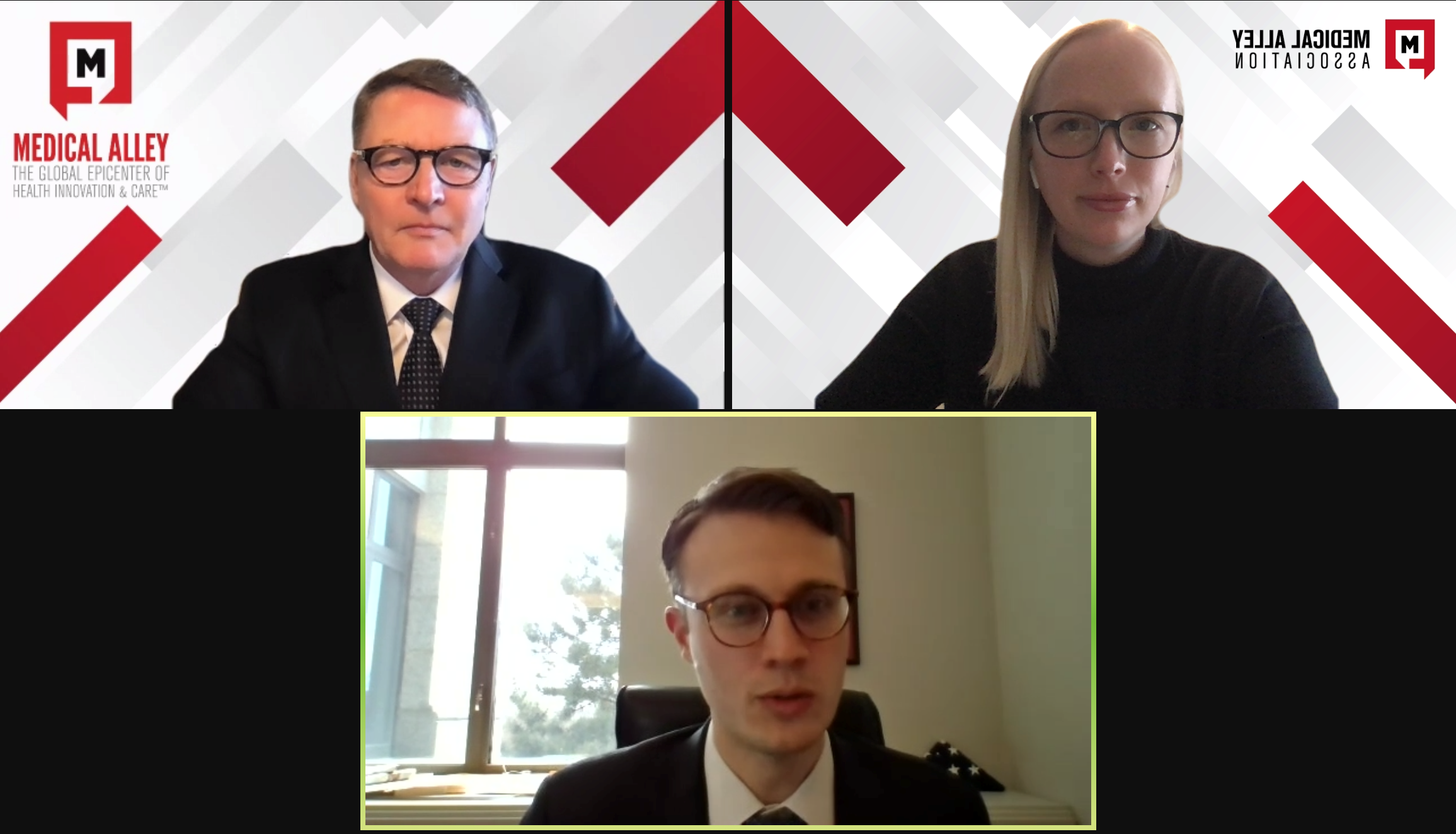
Representative Jordan Rassmusson meets with Medical Alley Interim President & CEO Steffen Hovard.
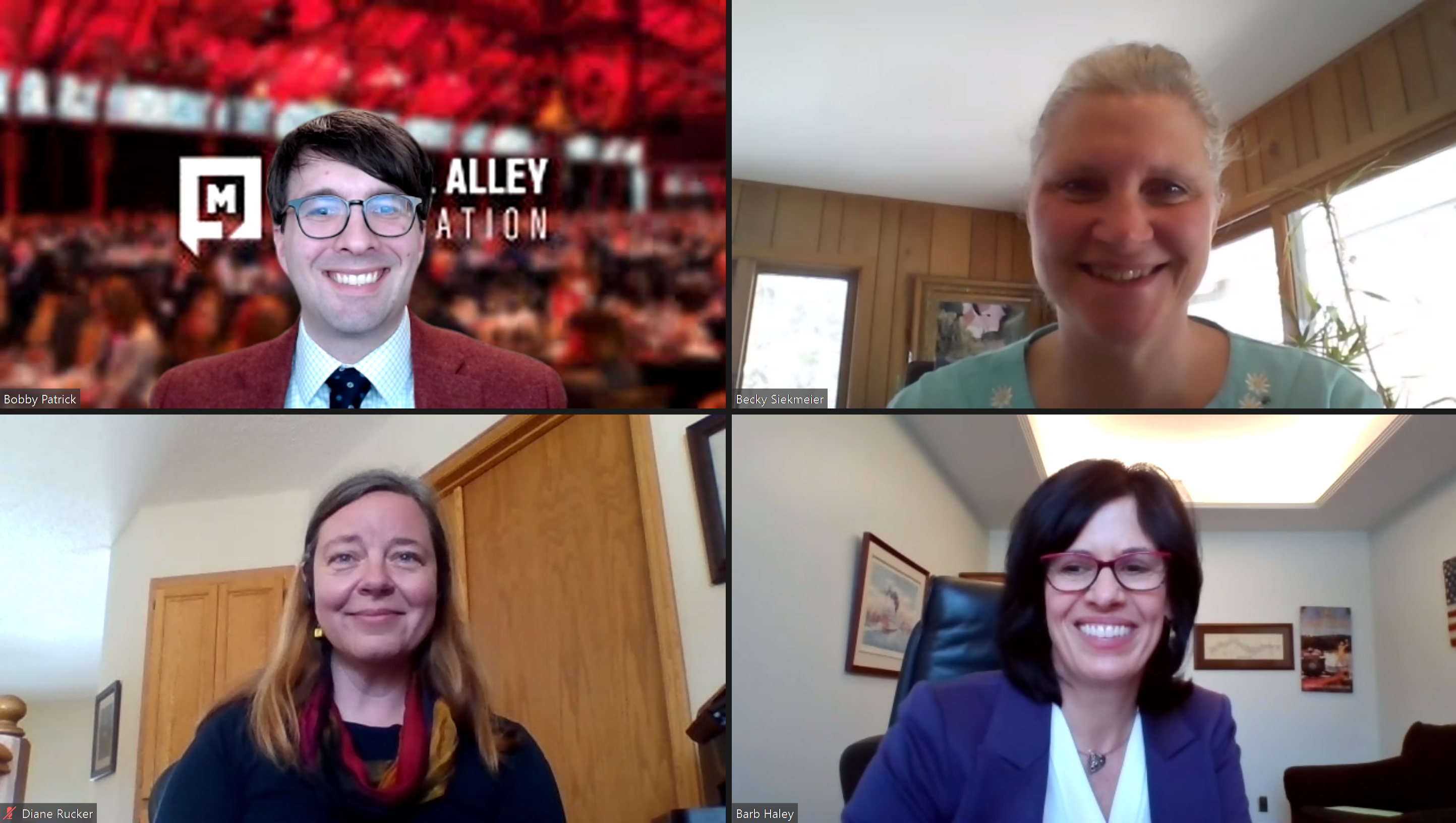
Representative Barb Haley speaks with leaders from University Enterprise Laboratories and the Minnesota Technology Association.
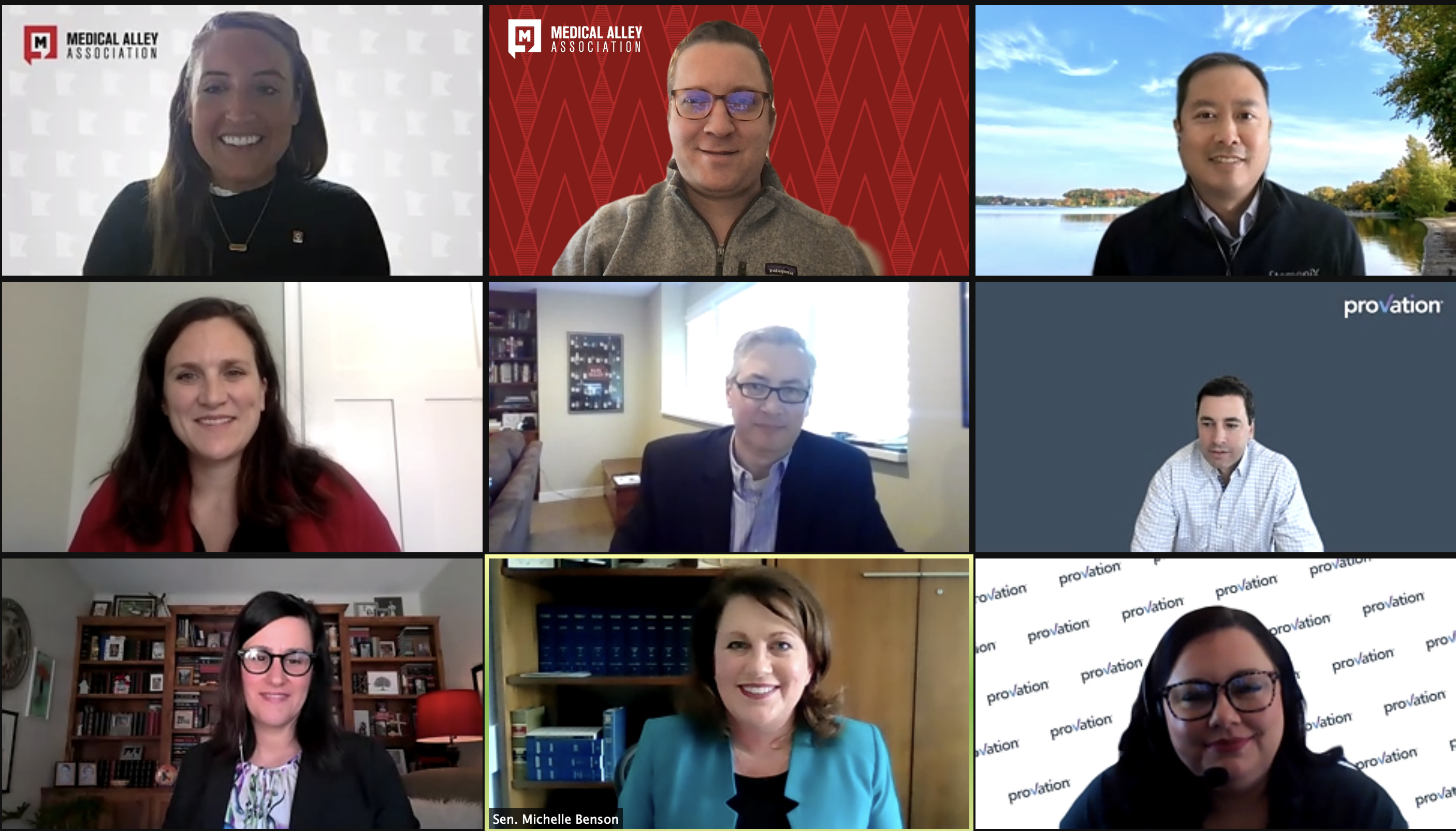
Senator Michelle Benson meets with Medical Alley companies Vyant Bio, Medtronic, Lemhi Ventures, Provation, and the Hazelden Betty Ford Foundation.
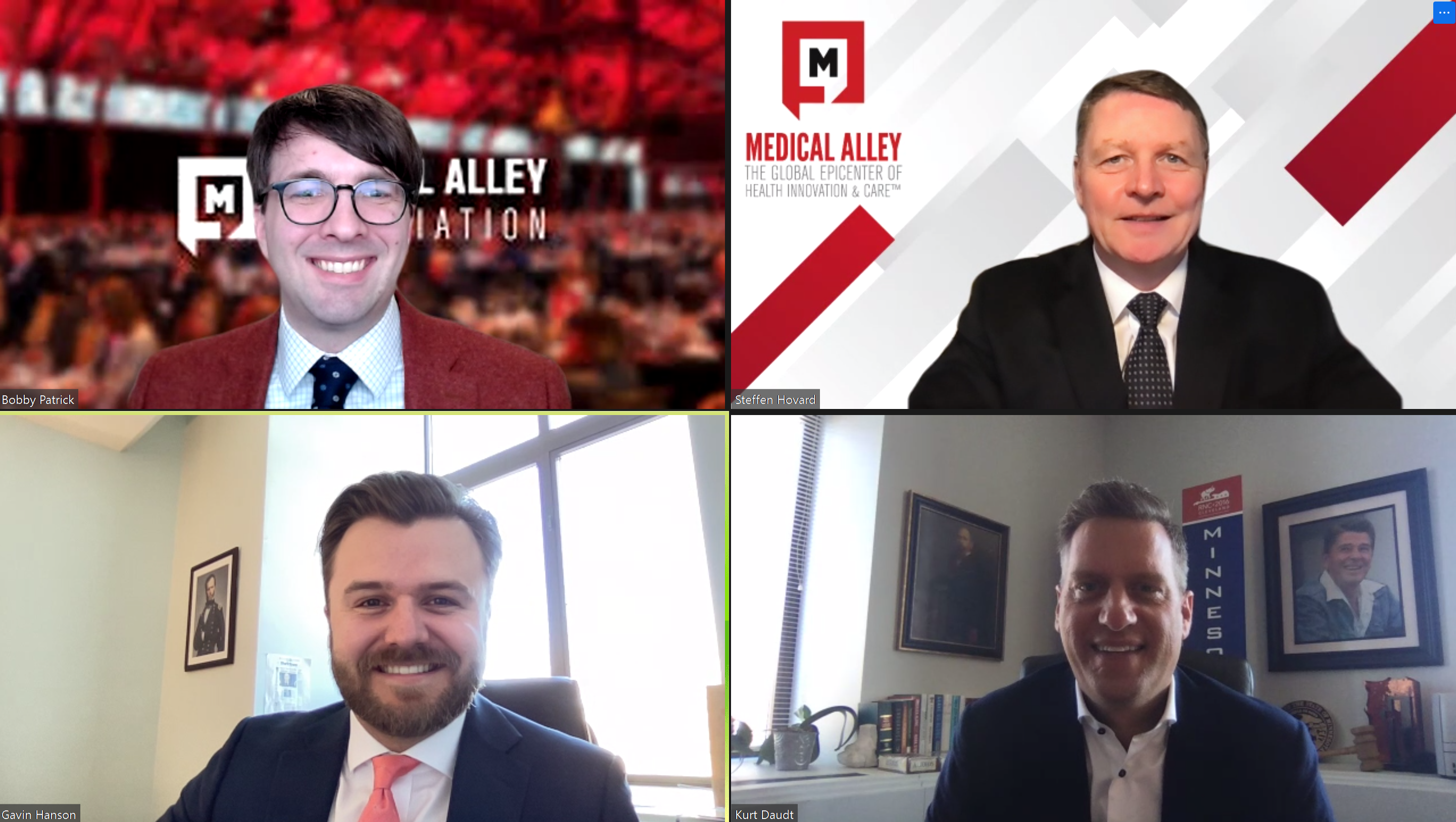
Minority Leader Kurt Daudt meets with Interim President & CEO of the Medical Alley Association, Steffen Hovard.
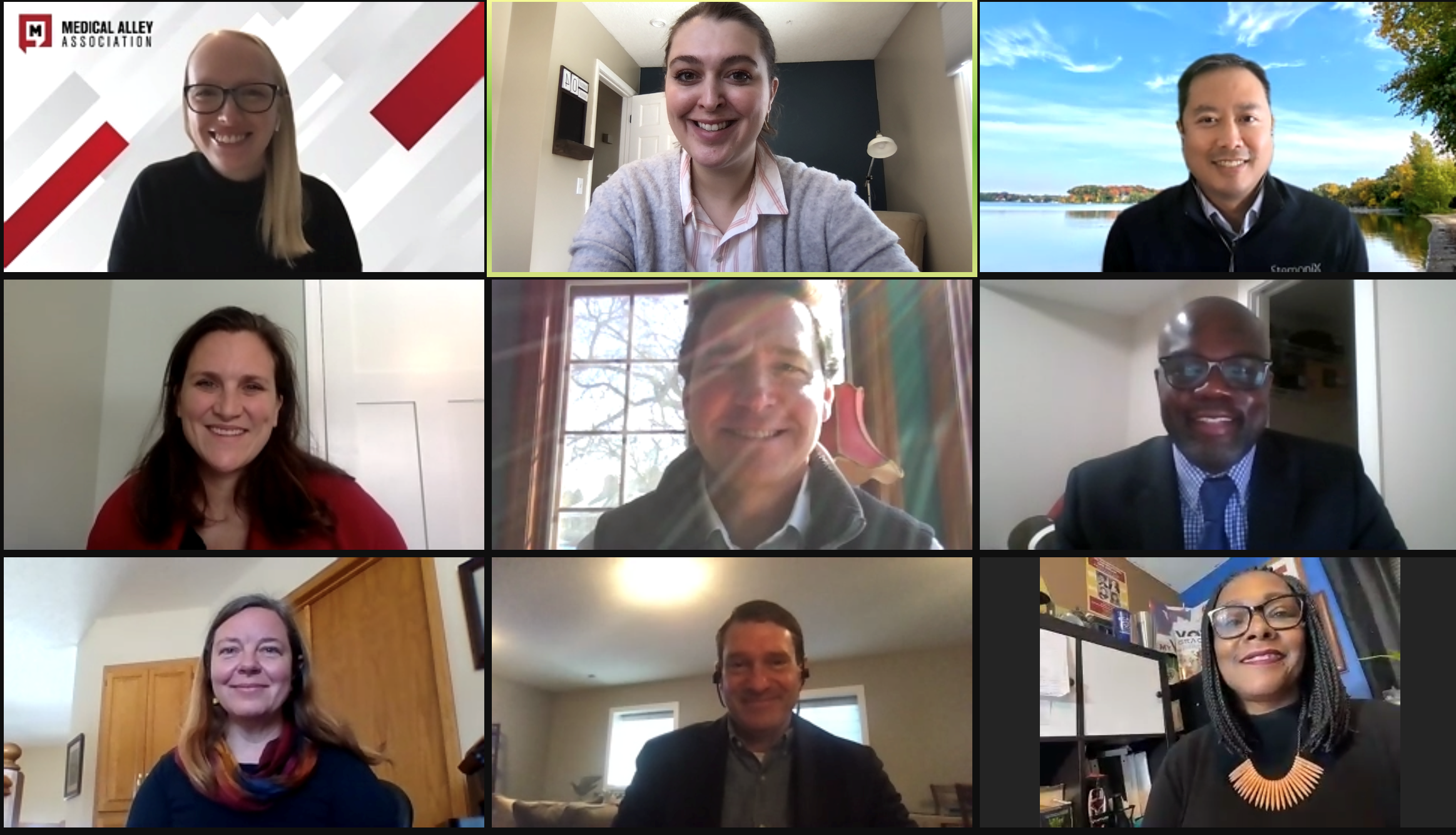
Representative Rena Moran speaks with leaders from Biomedix, University Enterprise Laboratories, Amgen, and Genentech, and the Hazelden Betty Ford Foundation.
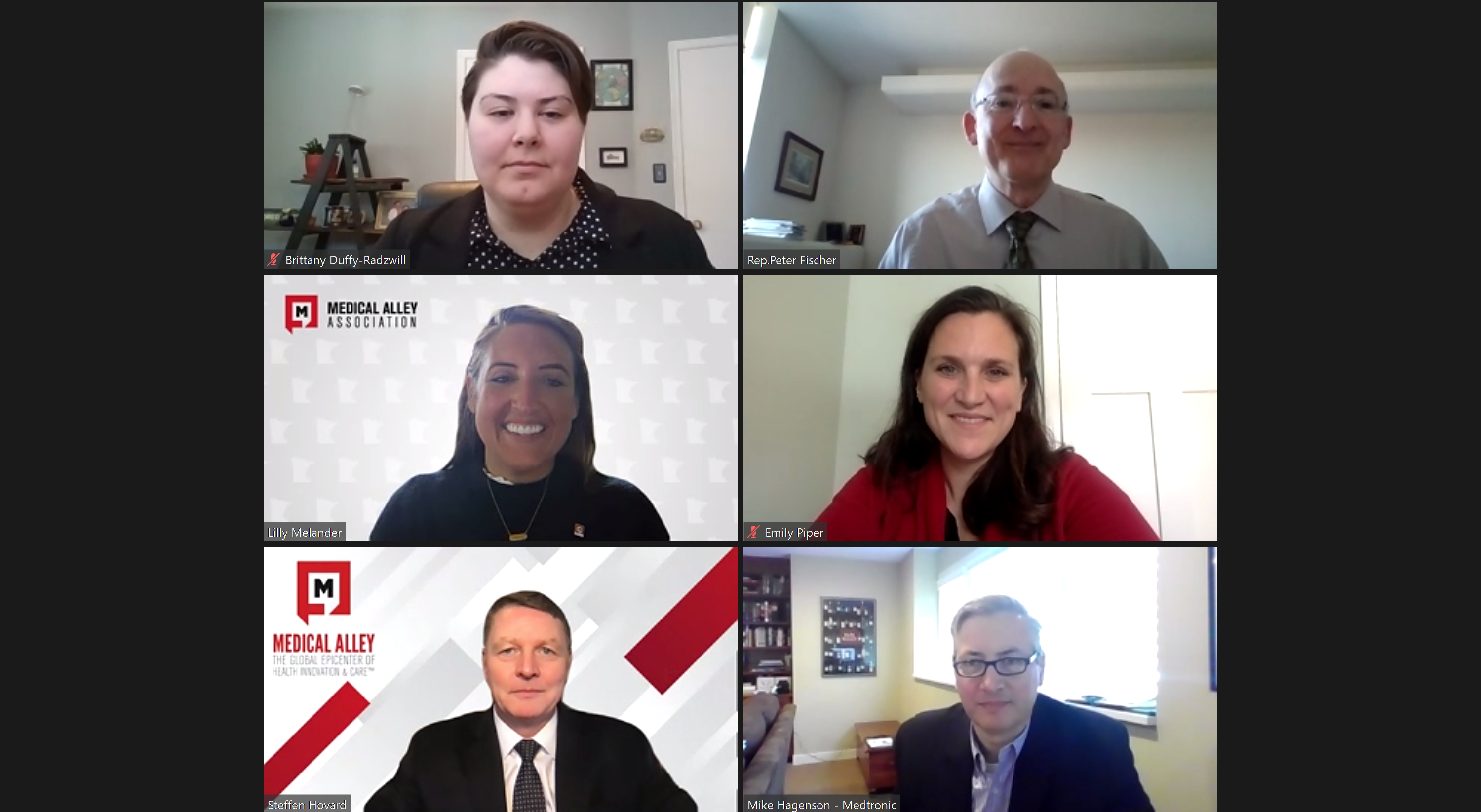
Representative Peter Fischer discusses issues with Medical Alley leaders from Medtronic, Otsuka, and the Hazelden Betty Ford Foundation.
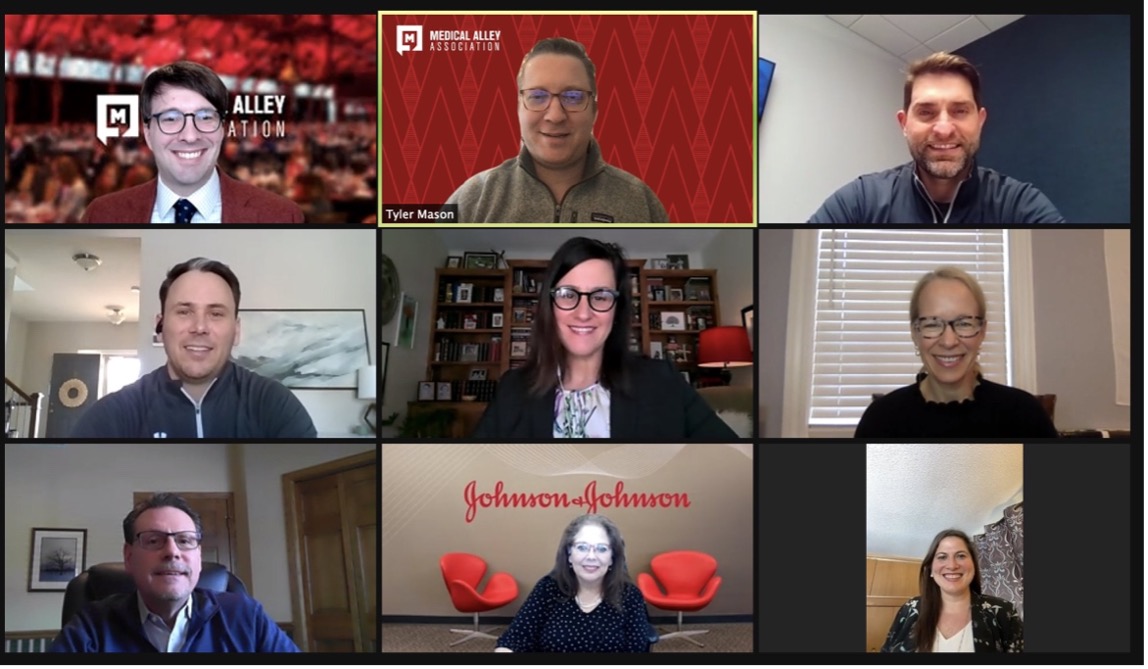
Representative Kelly Morrison takes time to meet with Johnson & Johnson, Lifesprk, Histosonics, Takeda, Upsher Smith, and Bristol-Myers Squibb.
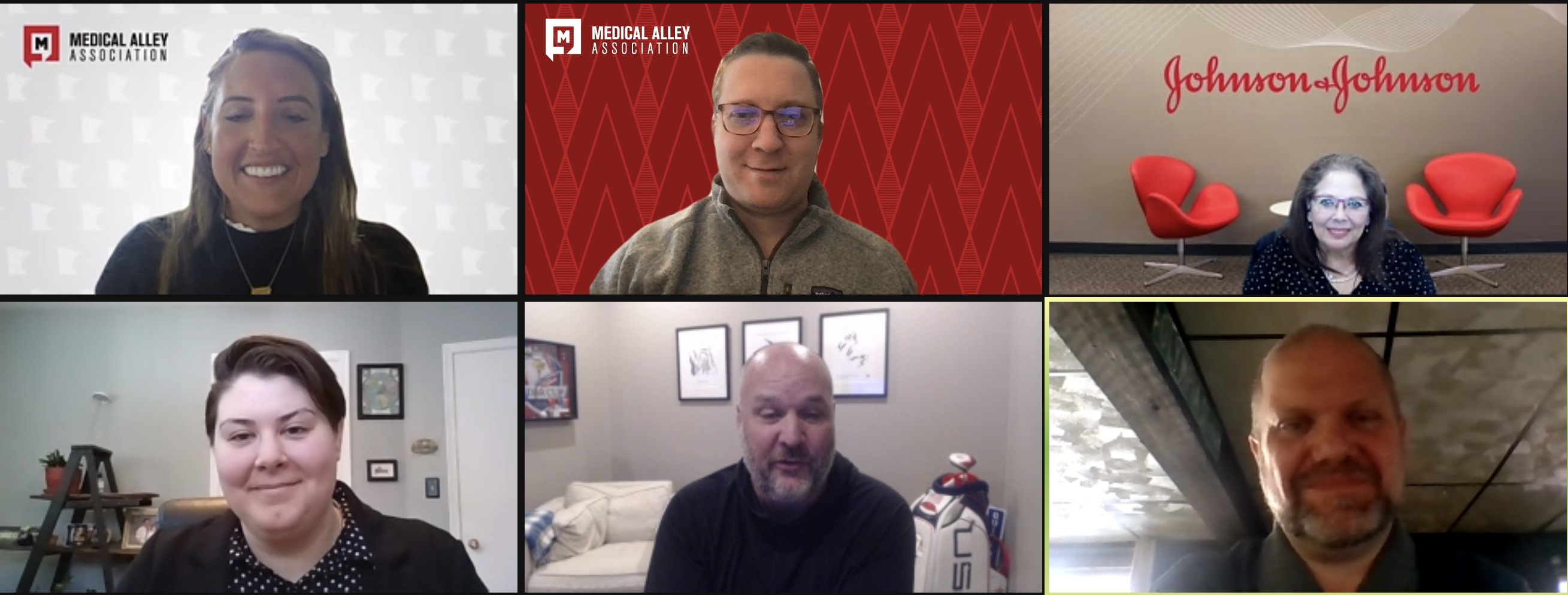
Representative Mike Freiberg joins a discussion with Vidscrip, Otsuka, and Johnson & Johnson.

Senator Carla Nelson speaks with leaders from Mayo Clinic.
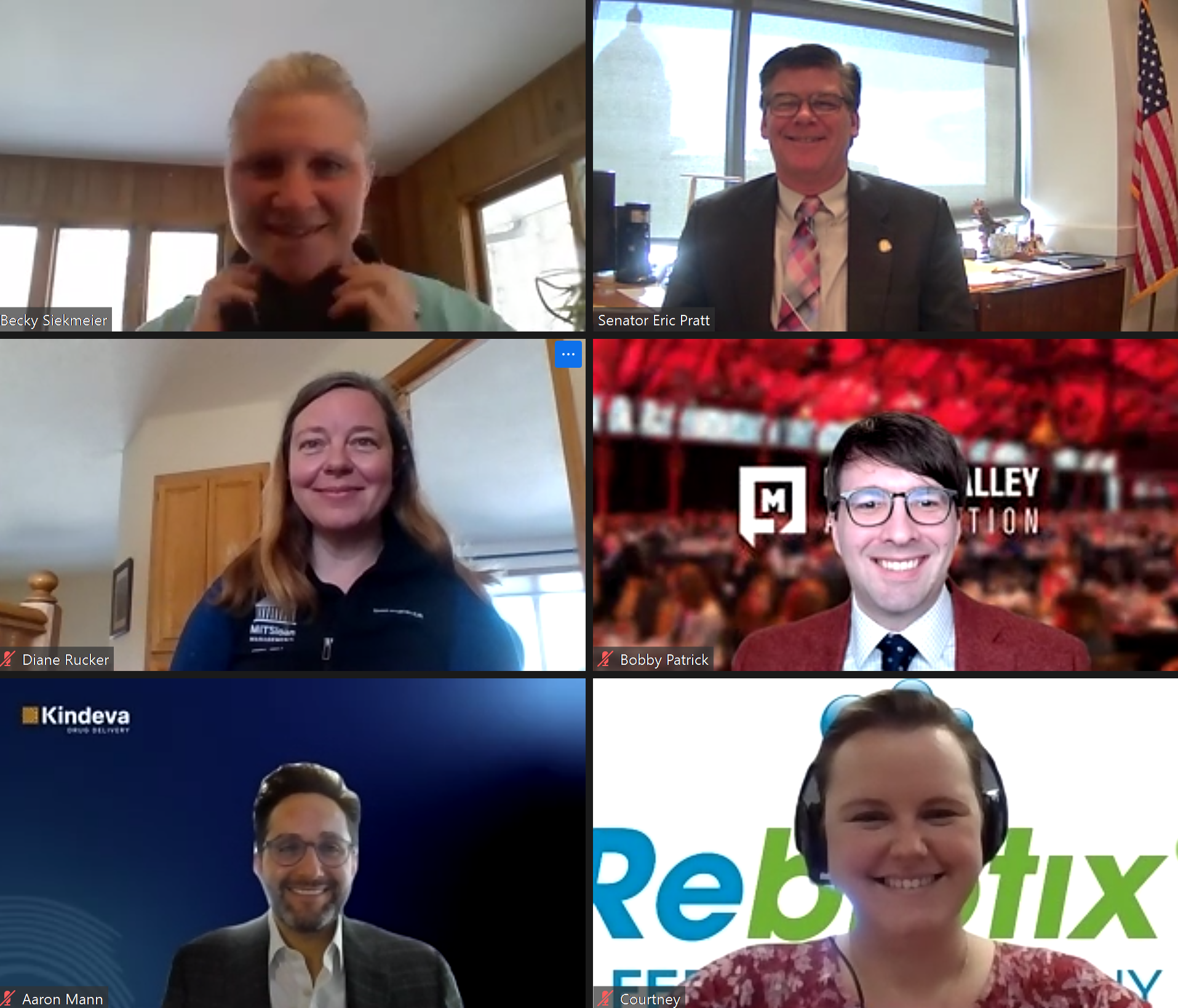
Senator Eric Pratt meets with University Enterprise Laboratories, Kindeva, the Minnesota Technology Association, and Rebioltix.
Spirit of the Alley awards
In April, we announced our 2021 Spirit of the Alley award winners: State Senator Michelle Benson and U.S. Representative Dean Phillips. We applaud both legislators’ dedication to Medical Alley and their commitment to both the healthcare industry in Minnesota and to keeping our state a destination for healthcare innovation and investment. We are thankful to Senator Benson and Representative Phillips for their years of hard work and dedication to their constituencies. We look forward to continued partnership in St. Paul and in Washington D.C.
Final takeaways, looking forward
Despite the circumstances of this virtual and at times unproductive session, the Medical Alley Association had one of its most successful sessions to date. Our advocacy efforts never stopped; our team pivoted and learned how to engage with legislators and staff virtually to ensure our policy priorities made it across the finish line.
We are grateful and fortunate to have members who are eager to engage with policymakers, lend expertise, and help our association lead the way in medical innovation. Thank you for your continued partnership this session.
The 2022 legislative session gavels in on January 31, 2022. This is an earlier start than normal for a non-budget year, but is most likely due to redistricting.
Legislators are now enjoying a much-needed break from their work at the state’s capitol. It has been many months of regular session bookended by special sessions to renew the Governor’s emergency powers. For now, we get to put that behind us, allowing legislators to return to their communities, reset from the frustrations in St. Paul, and enjoy a much needed rest.
